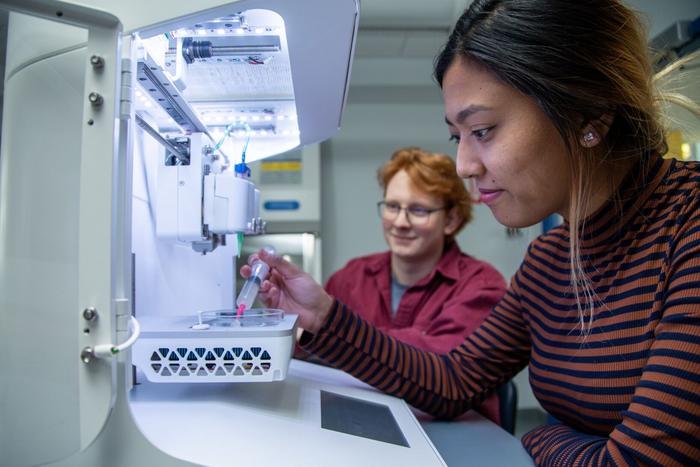Novel solution for Pichia pastoris enzyme production platform
The demand for industrial enzymes is continually rising, driven by the growing need to shift towards more sustainable industrial processes. Our research outlines a novel approach in enzyme production, harnessing the untapped potential of cyanobacterial biomass within the P. pastoris platform. Group Leader, Dr. Schieder, highlights the nature of the study, stating, “Our work reveals […]

The demand for industrial enzymes is continually rising, driven by the growing need to shift towards more sustainable industrial processes. Our research outlines a novel approach in enzyme production, harnessing the untapped potential of cyanobacterial biomass within the P. pastoris platform. Group Leader, Dr. Schieder, highlights the nature of the study, stating, “Our work reveals the potential of cyanobacterial biorefineries to support enzyme production.”

Credit: Dr. Doris Schieder, Chair of Chemistry of Biogenic Resources, Technical University of Munich, Campus Straubing for Biotechnology and Sustainability, Germany
The demand for industrial enzymes is continually rising, driven by the growing need to shift towards more sustainable industrial processes. Our research outlines a novel approach in enzyme production, harnessing the untapped potential of cyanobacterial biomass within the P. pastoris platform. Group Leader, Dr. Schieder, highlights the nature of the study, stating, “Our work reveals the potential of cyanobacterial biorefineries to support enzyme production.”
This achievement stems from an extensive multi-field approach. We characterized and expanded a combinatorial library, streamlining P. pastoris engineering for enhanced efficiency. Rigorous screening of these libraries yielded potent enzyme-producing strains enabling the development of a fed-batch strategy for efficient AppA E. coli phytase expression. A key element is the successful utilization of Nostoc sp. De1 biomass hydrolysate as substrate for fermentation, presenting a viable and sustainable alternative to conventional feedstock. Korbinian Sinzinger underscores the importance of this research, stating, “Our findings demonstrate that the extended P. pastoris toolkit not only generates high-performing producer strains but also offers a greener pathway for enzyme expression, addressing the critical need for sustainable biobased production.”
See the article:
DOI
https://doi.org/10.1016/j.jobab.2023.12.005
Original Source URL
https://www.sciencedirect.com/science/article/pii/S2369969823000798
Journal
Journal of Bioresources and Bioproducts
Journal
Journal of Bioresources and Bioproducts
DOI
10.1016/j.jobab.2023.12.005
Method of Research
Experimental study
Subject of Research
Cells
Article Title
The Pichia pastoris Enzyme Production Platform: from Combinatorial Library Screening to Bench-Top Fermentation on Residual Cyanobacterial Biomass
Article Publication Date
26-Dec-2023
COI Statement
There are no conflicts to declare.
What's Your Reaction?

































